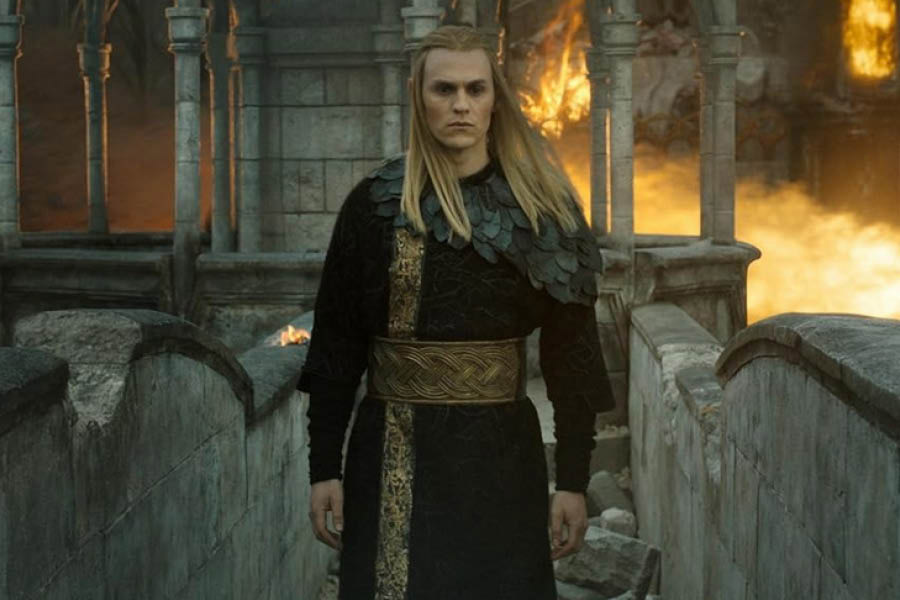Eight episodes of the prequel to The Hobbit and The Lord of the Rings is streaming on Amazon Prime Video

Charlie Vickers as Sauron in the garb of AnnatarIMDb, Prime Video – © Amazon MGM Studios
There are two reasons why this review of the second season of The Lord of the Rings: The Rings of Power comes two weeks too late. First, it took me a lot of time to convince myself to start watching it — yes, the first season had left that much of an impact. Second, it took me forever to get through the eight episodes, each of which was one hour long but felt like three hours at least.
Season two of The Rings of Power builds on the positives of the first season — beautifully shot, gorgeous sets and locations, grand costumes and world building. Unfortunately, it also makes everything about the season that was bad even worse. Pacing issues, sub-par acting and too many subplots are just a few of the problems plaguing Middle-Earth once again. That apart, there’s of course Sauron and Adar and daft Elves who make bizarre decisions that make things worse.
The season opens where the first left off, with Halbrand (Charlie Vickers) being identified as Sauron and on his way to Mordor. Only it goes back about a thousand years to give us his backstory — he is stabbed to death by Adar’s orcs, becomes a black goo which plops around Middle-Earth till he eats a hapless old woman and takes the form of Halbrand. The rest we’ve seen in season one — he makes goo goo eyes at Galadriel (Morfydd Clark), who brings him to Eregion where he helps Celebrimbor (Charles Edwards) forge three Elven rings before being identified as Sauron by Galadriel, who for some reason keeps the fact that Halbrand was Sauron from Elrond (Robert Aramayo) and Celebrimbor.
The tale then branches out into other storylines — Adar and his war against Sauron, the Stranger and his quest for a staff along with his companions not-Frodo and not-Sam (fine, Nori and Poppy, the Harfoots), the Dwarves and their troubles, and the fickle Numenoreans — sometimes within one episode, sometimes forgotten for two.
Here’s what worked (very little) and what didn’t (almost everything else), for me.
What worked
The look and feel: As with the first season, Amazon has spared no expense in bringing Middle-Earth to life. Shot across the UK and Europe instead of New Zealand this time, the show has stunning visuals, grand sets and beautiful costumes that will leave you in awe. It is the one thing, despite the heavy use of CGI, that the show manages to get right throughout.
The Sauron-Celebrimbor story arc: Despite breaking canon and showing the forging of the Elven rings first, Sauron’s return to Eregion and his manipulation of Celebrimbor into crafting more rings — seven for the Dwarves and nine for the mortal Men — is one of the most interesting parts of the show. Both Vickers and Edwards play their part well, with Vickers bringing the menace one would expect from Sauron and Edwards both pride and vulnerability.
Elrond: Now, this character has really grown on me and I seriously think that he should be the main lead of the show. He is smart, he can see the larger picture, he takes sensible decisions and is played by an actor who can, thankfully, act.
What didn’t work
Anything Galadriel: Even though her screen time has been reduced significantly, it’s still too much. If the show is going off canon so much, is it too much to hope that she will be offed soon? She can always be brought back by claiming she wasn’t Galadriel at all but someone working in league with Sauron. It’s not just the fact that Clark is still too mousey to resemble the literary version of Galadriel or that every time she tries to emote her face ends up pinching into funny expressions. The character itself seems to be the daftest on Middle-Earth. First, she doesn’t tell Celebrimbor the identity of Halbrand and leaves him vulnerable. Then, she loiters about helping hapless Elven women (!!) escape when she is carrying the nine rings that need to be taken away from Sauron. She escapes Adar to go to Eregion, only to escape Eregion and return to him. Finally, when Sauron appears and the orcs are stabbing Adar to death, she stands and waits for Sauron to finish with him before dealing with her instead of running away or fighting. Who in their right minds would let her lead anyone?
The Stranger storyline: Well it is confirmed that the Stranger is Gandalf, though he is here too early (we don’t know how they will navigate that). Gandalf apparently comes from Grand Elf, something the Stoors call him exactly three times (really?! Was it too hard to stick to the canon here? When he first arrives he is known as Mithrandir. He is called Gandalf much later). We immensely enjoyed meeting Tom Bombadill and hearing the Tom Bombadill song, but a quest for a staff? Really? Also this storyline is so disconnected from the rest of the show that it sticks out like a sore thumb.
The fickle Numenoreans: Now, this could’ve been a goldmine in terms of exploring politics. Instead, we get a bunch of fickle people who change their minds and opinions on the vaguest of things — a giant eagle lands on the verandah and the people support Pharazon; a giant squid refuses to eat Miriel and the people go back to supporting her. Then there is Isildur, who likes a woman, then imprisons her, then likes her again, then gives her up when her betrothed appears, then kisses her and asks for passage to Numenor with her, then he leaves by himself on the ship anyway. Yep.
The ridiculous dialogues: What is written to sound deep and philosophical often bordered on the absurd. The worst of it is foisted on the Elves, many on the Stranger and his companions, and a few stray ones are left for Sauron as Annatar. The most terrible, perhaps, are the moments when the writers forget which show they are writing for and end up with dialogues like ‘a wizard doesn’t find his staff, it’s the staff that finds him’ (does Gandalf then go to Hogwarts to learn how to control his magic?). Most of the times when Annatar is supposed to be deceiving Celebrimbor he sounds like he is gaslighting, like he is a petty abuser — ‘Your suffering is of your creation because you were obstinate and forced me into torturing you to make the rings’. I am paraphrasing here, but really?!
Lapse of logic: Arondir is stabbed through his torso, but the next time we see him he is absolutely fine. Sauron journeys to Mordor only to turn around and go back to Eregion in a very short time (because fast travel). A mere dozen of the Dwarves who arrive from Khazad dum (they must have teleported to reach that soon) suddenly turn the tide against the orcs. The Stoors decide to go wandering because fixing a few houses is more troublesome than venturing into the unknown. These are just a few times that the writing defied all logic, then there are all the unnecessarily drawn out moments that slow down the pace and add nothing of import.
Lord of the Rings: The Rings of Power is a prime example of how spending lavishly doesn’t always make a good show. If something doesn’t give — Galadriel dying/going into a coma, change of showrunners and writing team — before the next season, no one is going to be able to convince me to watch the third season of the show.





